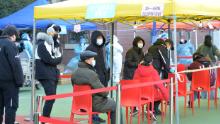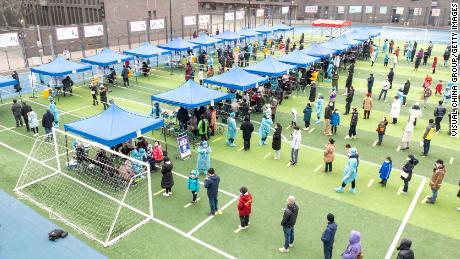Tianjin, which detected China’s first community spread of Omicron on Saturday, is rolling out a second round of mass testing on its 14 million residents on Wednesday. As of noon Tuesday, 97 people had tested positive.
The outbreak has already spread to Anyang, a city in Henan province some 300 miles (482 kilometers) away, prompting a full lockdown. On Wednesday, the city of Dalian in northeastern China said two recent returnees from Tianjin had tested positive — raising fears that the new variant has spread to another city.
The Omicron outbreak is particularly worrying to officials in Beijing, which lies about 80 miles northwest of Tianjin — and about 30 minutes away by high-speed rail. The Chinese capital is due to host the Winter Olympics on February 4.
Tianjin officials said at a news conference Tuesday that all bus services to Beijing had been suspended. Train tickets from Tianjin to Beijing have been closed for purchase online since Sunday evening.
On Wednesday, 425 flights were canceled at Tianjin Binhai International Airport, accounting for 95% of all scheduled flights, according to flight tracking app VariFlight.
Tianjin authorities on Sunday ordered citizens not to leave the city unless absolutely necessary. Those who want to leave must present a negative Covid test taken within 48 hours and obtain approval from their employer or local government offices.
“Therefore, whether it is in terms of virus origin tracing, epidemiological investigations or restrictions and controls, the Omicron variant has brought unprecedentedly massive challenges,” she said.
On Tuesday, Anyang city in Henan province was placed under strict lockdown, after two Omicron cases linked to the Tianjin outbreak were identified over the weekend. The city has reported a total of 123 cases.
In Anyang, all 5.5 million residents are confined to their homes, while businesses and factories are shut. More than 4,000 students and staff from a school have been transferred to government-run quarantine facilities after nearly a dozen people tested positive for the virus. Videos from state media show students from elementary school to high school in full hazmat suits being uploaded to buses.
A university student who returned to Anyang for winter break from Tianjin on December 28 is believed to have brought back the virus — suggesting the variant has already been spreading in Tianjin for nearly two weeks, at the least.
Authorities did not specify whether the students had Omicron, but their travel history showed they had spent five days in Jinnan district, where the Omicron outbreak was most serious, before leaving Tianjin by train. They tested negative when they left Tianjin — and again on Monday, after arriving in Dalian.


The arrival of Omicron has again raised concerns about the effectiveness of China’s domestically made vaccines such as Sinovac and Sinopharm.
China has not approved Pfizer or other mRNA vaccines made in the West.
In addition to Omicron, Delta cases have continued to spring up across the country, prompting local authorities to impose a flurry of restrictions. A growing list of cities, including Beijing, have urged residents not to leave town during the Lunar New Year holiday, the most important festival for Chinese people to reunite with their family.
In Zhengzhou, the provincial capital of Henan, authorities on Tuesday shut all non-essential businesses, such as beauty salons, banned dining in restaurants and suspended buses and taxis in higher risk areas. Zhengzhou has reported more than 100 cases this year.
In Yuzhou, another city in Henan, its 1.2 million residents have been locked down since January 2 to fight a Delta outbreak, which has infected 234 people.
Across China, about 20 million people are now under strict lockdown, including 13 million residents of the northwestern city of Xi’an, who are entering their third week of home confinement.
And in the southern metropolis of Shenzhen, eight Delta cases have been reported since Friday. Shenzhen health authorities have blamed imported goods as likely source of the outbreak.
China on Wednesday reported 166 symptomatic infections, including 118 in Henan province, 33 in Tianjin, 8 in Xi’an and 7 in Shenzhen.








